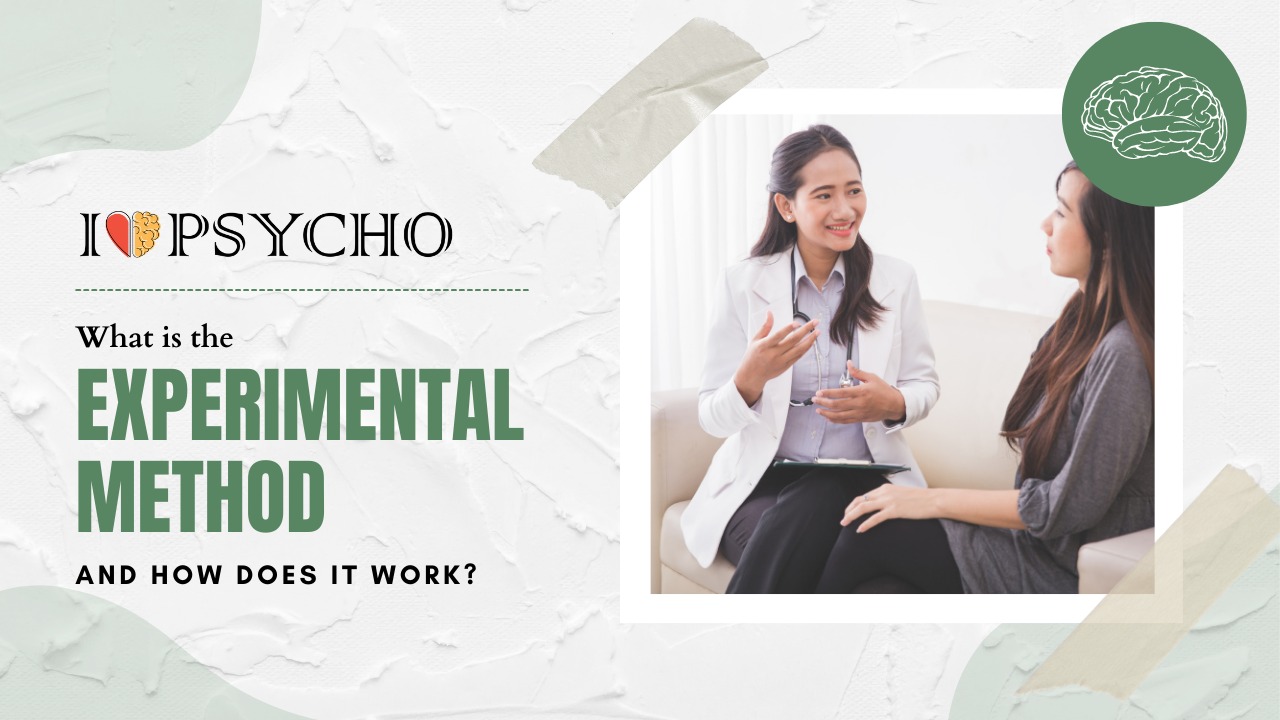How do scientists study the mind and behavior of humans? The experimental method allows researchers to examine cause-and-effect relationships. The experimental method is used by researchers to identify and describe important variables, form hypotheses, deceive the variables, and gather data on the results. Extraneous variables are carefully managed to ensure that they have the least possible impact on the experiment’s outcome. The experimental method entails manipulating variables in order to establish cause and effect relationships. Controlled methods and the random assignment of participants to controlled and experimental groups are key features.
An experiment is a research that scientifically tests a hypothesis. An experiment manipulates an independent variable (the cause) and the dependent variable (the result) is measured. The advantage is to have objective experiments. The researchers’ views and opinions should have no bearing on the study results. It is good because it renders the data valid and less prejudicial.
How Experimental Method Works
There are a few key terms to understand before you can understand how the experimental method works-
The treatment the experimenter manipulates is the independent variable. This variable is thought to have an impact on another variable. For example, if we want to examine whether high levels of vehicle exhaust have an effect on children’s asthma, vehicle exhaust is the independent variable whereas asthma is the dependent variable. The amount of sleep a person gets would be the independent variable in a study looking at how sleep affects test scores.
The effect that the experimenter is measuring is the dependent variable. The test scores would be the dependent variable in the previous example. For an experiment to be carried out, operational definitions are necessary. If we are saying that something is an independent variable, we must be very clear in defining the meaning and scope of the variable.
A hypothesis is a preliminary statement of the possible relation between two or more variables. In our previous example, the researcher might assume that those who sleep more will do better on the next day on a math test. The objective of the experiment is to either support this hypothesis or fail to support it.
Experimental Design
The experimental design is the theoretical framework in which research is carried out; it serves as the guideline for data collection, measurement, and analysis.
Research design must contain-
- a concise statement of the research question
- procedures and methods to be used in data collection
- the population to be studied
- techniques for data processing and analysis
When it comes to conducting an experiment, psychologists, like other scientists, use the scientific method. The scientific method is a set of procedures and principles that scientists use to formulate research questions, collect data, and draw conclusions.
The process is divided into four steps:
- Developing a Theoretical Framework
- Collecting data and designing a study
- Finding Conclusions and Analyzing the Data
- The Findings Are Shared
- Conclusion
Importance of good experimental design
- It makes the diverse research operations run more smoothly.
- Making research as efficient as possible in order to obtain the most information with the least amount of effort, time, and money.
- The term “research design” refers to the advanced planning of the methods to be used for collecting relevant data and the techniques to be used in their analysis, while keeping in mind the research objective and the availability of staff, time, and money.
- The research design has a significant impact on the reliability of the results.
- The design aids the researcher in organizing his thoughts into a form.
Ways of controlling extraneous variables
Extraneous variables jeopardize the experiment’s internal and external validity. There are 4 methods for controlling the effect of extraneous variables.
- Randomization
- Treatments are randomly assigned to the experimental groups. This technique works only when the sample size is large.
- Randomization is the most common method to assign subjects to treatments.
- Random assignment means each subject in a pool of subjects has an equal opportunity to be selected.
- Matching
- All treatment groups are equal in terms of subject characteristics is called matching.
- Matching techniques can be very powerful in eliminating bias due to subject characteristics, if the experimenter knows what subject variables are highly related to the experiments task.
- Difficulty in this technique is to find subjects of matching characteristics.
- Statistical control
- Statistical methods help to bring down the effect of extraneous variables.
- Analysis of Covariance (ANOVA) is one of the data analysis techniques that aids in limiting the effects of extraneous factors on the study.
- Through ANOVA technique we can investigate any number of factors which are hypothesized or said to influence the dependent variable.
- This method is used if there are various sample cases.
- Significance of the difference between the mean of two samples can be judged through z-test and t-test.
- Use of experimental design
- In certain studies, experimental design plays a crucial role in reducing the impact of the extraneous variables.
Experiments of Various Types
Researchers can choose from a variety of different types of experiments. A variety of factors, such as the participants, the hypothesis, and the researchers’ resources, may affect the types of experiment selected.
Experiments in Field
Researchers may choose to conduct their experiments in the field on occasion. Consider the case of a social psychologist who wants to learn more about prosocial behavior (it refers to actions that are intended to benefit others. Feelings of empathy and concern for others are examples of prosocial behaviors). The experimenter could have someone pretend to pass out and time how long onlookers take to react.
This type of experiment can be an excellent way to observe behavior in real-life situations. It does, however, make it more difficult for researchers to control the variables, and it can introduce confounding variables that can skew the results.
Laboratory Experiments
Experiments in the laboratory are very common in psychology since they allow more control of variables for experimenters. Other researchers can also replicate these experiments more easily. Naturally, the problem is that what is happening in a lab is not always the same as what is in the real world.
Quasi-Experiments or Natural Experiments
Researchers can use a type of experiment known as a quasi-experiment in addition to lab experiments. Quasi-experiments and true experiments can both be conducted in the field. Because the researchers do not have complete control over the independent variable, quasi-experiments are also known as natural experiments.
Instead, the level of treatment is defined by the situation’s natural conditions. For example, a researcher who sees a difference of personality and birth order cannot manipulate the independent variable in the circumstance. Treatment levels cannot be allocated by chance since people are naturally assigned to pre-existing groups in their families based on their birth order.
So why is a researcher going to use an almost experiment? This is a good choice for scientists in situations where researchers are interested in natural, actual phenomena. It is also a good choice when the independent variable concerned cannot be ethically manipulated by the researchers.
Understanding Key Terms
There are a few key terms to understand before you can understand how the experimental method works.
- Variable: Concept which can take on different quantitative values is called variable.
- Independent variable: A variable which the experimenter manipulates with the expectation that it will have a direct impact on the dependent variable.
- Dependent variable: Variable that experimenter measures.
- Extraneous variable: Independent variable that is not related to the purpose of the study, but may affect the dependent variable.
- Confounded relationship: When the dependent variable is not free from the influence of an extraneous variable, the relationship between the dependent and independent variable is said to be confounded by an extraneous variable.
- Continuous variables: Continuous variables are phenomena that can have quantitatively different outcomes, even to the decimals.
- Discrete variables: All variables are not continuous, if they can only be expressed in integral values, they are non-continuous variables or in statistical language discrete variables.
References-
McLeod, D. S. (2012). Experimental Method. Simply Psychology









